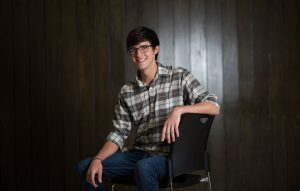UNT’s Jacob Sampson Wins Vaclav Havel Competition With Full-Length Play
ArtandSeek.net June 27, 2016 13Jacob Sampson had never written a full-length play when he heard about the Vaclav Havel Library Foundation’s contest. He hadn’t read Havel’s “The Memorandum” — in fact, he hadn’t even heard of Havel. But when Andrew Harris, his professor at the University of North Texas, sent him a flyer about the VHLF competition, he read the play and had a stroke of inspiration that launched him into a series of sleepless nights and endless rewrites. Last Tuesday, the UNT senior found out that he won the competition.

Jacob Sampson. Photo: UNT
Sampson’s play, “The Essay,” won the Václav Havel Library Foundation Award and DAMU Contest for the U.S. Students of Drama and Performance Studies, one of the most prestigious playwriting awards for students. The prize is a two-week residency in the Czech Republic in November, Sampson’s first trip ever to Europe, where he will attend classes at the Academy of Performing Arts (DAMU), have his play read by faculty there and visit local theaters around Prague.
“The Memorandum” is a black comedy from 1965 about a fictional language called Ptydepe, which is used in an unnamed organization in order to increase efficiency. Sampson wrote a play that serves as what he thinks of as a sequel, wherein a new headmaster in an American boarding school requires students to use Ptydepe. He mimicked Havel’s theme and tone, though he says he injected his own style into the work.
“Memorandum has a very dry, very sarcastic and long-winded type of humor,” he says. “I tried to incorporate that style, but also to work in my own comedy, which is a lot more obvious.”
Comedy is his favorite genre, and the 22-year-old hopes to be a television comedy writer. He started writing plays two years ago, when he took Harris’ class. In high school, he had been interested in acting, but writing several short plays in class, and seeing them performed, shifted his focus to playwriting. “The Essay” is his first full-length play, so he went into the writing process with very little idea of what to do.
“I sacrificed a lot of sleep,” he says. He’d never set foot in the library before, but when he started writing, he found a windowless basement where talking was forbidden. With an ending already in mind as he started writing, he had to work through 120 pages that he was constantly drafting and redrafting.
“When I finished the second chapter, I had to go back and rewrite the first,” he admits. “And any time I wrote a new scene, I would change things and have to go back and rewrite everything else.” He says his determination carried him through, and he learned a lot about writing a full-length play from the process. In his last year at UNT, he’ll write a second full-length play as part of a class with Harris. After that, he’s planning on staying in the Dallas-Fort Worth area, for the time being, to pursue more theater.
Right now, he’s learning to be flexible about his work, as he’ll have to be for a career in playwriting or screenwriting. He says watching a shorter play that he wrote put on without much of his input was a strange, even frustrating experience.
“It just was not like what I’d envisioned,” he says. “But it taught me a lot about how interpretable the work can be, and how flexible I need to be.”









